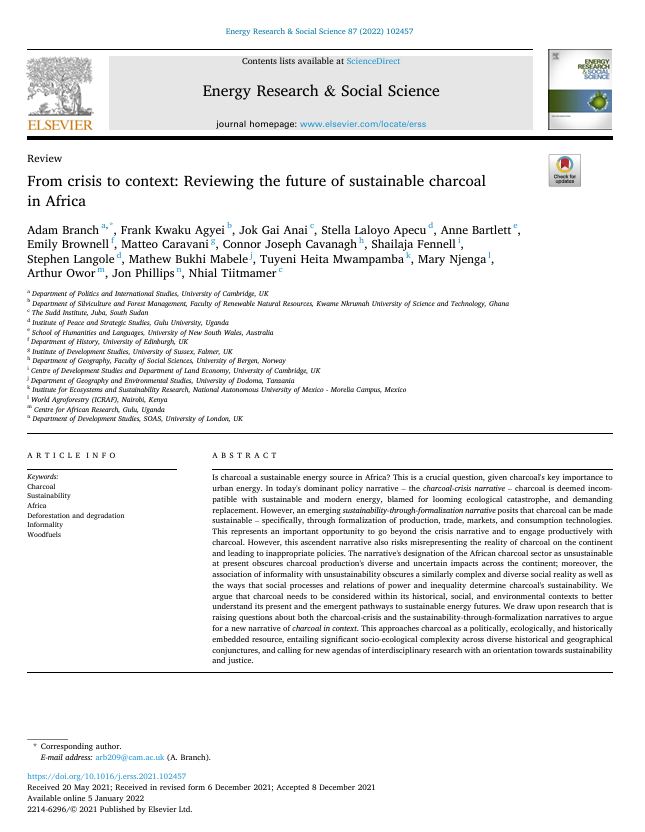From crisis to context: Reviewing the future of sustainable charcoal in Africa
 |
article Jan 2022 ; 15 pages
Aut. Adam Branch & Frank Kwaku Agyei & Jok Gai Anai & Stella Laloyo Apecu
Ed. Elsevier - Philadelphia
Téléchargeable sous format: PdF
Téléchargeable chez l'éditeur
Résumé:
Le charbon de bois est-il une source d'énergie durable en Afrique ? C'est une question cruciale, compte tenu de son importance cruciale pour l'énergie urbaine. Cela représente une opportunité majeure de dépasser le discours sur la crise et d'aborder le charbon de bois de manière productive. Cependant, ce discours dominant risque également de déformer la réalité du charbon de bois sur le continent et de conduire à des politiques inappropriées. Qualifier le secteur africain du charbon de bois de non-durabilité actuelle occulte les impacts divers et incertains de la production de charbon de bois sur le continent ; de plus, associer informalité et non-durabilité occulte une réalité sociale tout aussi complexe et diversifiée, ainsi que la manière dont les processus sociaux, les relations de pouvoir et les inégalités déterminent la durabilité du charbon de bois. Nous soutenons que le charbon de bois doit être considéré dans ses contextes historique, social et environnemental afin de mieux comprendre son présent et les voies émergentes vers un avenir énergétique durable. Nous nous appuyons sur des recherches qui remettent en question à la fois la crise du charbon de bois et les discours sur la durabilité par la formalisation pour plaider en faveur d'un nouveau discours sur le charbon de bois dans son contexte. Cette approche considère le charbon de bois comme une ressource politiquement, écologiquement et historiquement intégrée, impliquant une complexité socio-écologique significative dans diverses conjonctures historiques et géographiques, et appelant à de nouveaux programmes de recherche interdisciplinaire orientés vers la durabilité et la justice. Abstract:
Is charcoal a sustainable energy source in Africa? This is a crucial question, given charcoal's key importance to urban energy. This represents an important opportunity to go beyond the crisis narrative and to engage productively with charcoal. However, this ascendent narrative also risks misrepresenting the reality of charcoal on the continent and leading to inappropriate policies. The narrative's designation of the African charcoal sector as unsustainable at present obscures charcoal production's diverse and uncertain impacts across the continent; moreover, the association of informality with unsustainability obscures a similarly complex and diverse social reality as well as the ways that social processes and relations of power and inequality determine charcoal's sustainability. We argue that charcoal needs to be considered within its historical, social, and environmental contexts to better understand its present and the emergent pathways to sustainable energy futures. We draw upon research that is raising questions about both the charcoal-crisis and the sustainability-through-formalization narratives to argue for a new narrative of charcoal in context. This approaches charcoal as a politically, ecologically, and historically embedded resource, entailing significant socio-ecological complexity across diverse historical and geographical conjunctures, and calling for new agendas of interdisciplinary research with an orientation towards sustainability and justice.
Public-Cible:
Mot clef: |
Editeur/Diffuseur: |
|
Elsevier - Philadelphia - Etats Unis |
En cas de lien brisé, nous le mentionner à communication@pseau.org